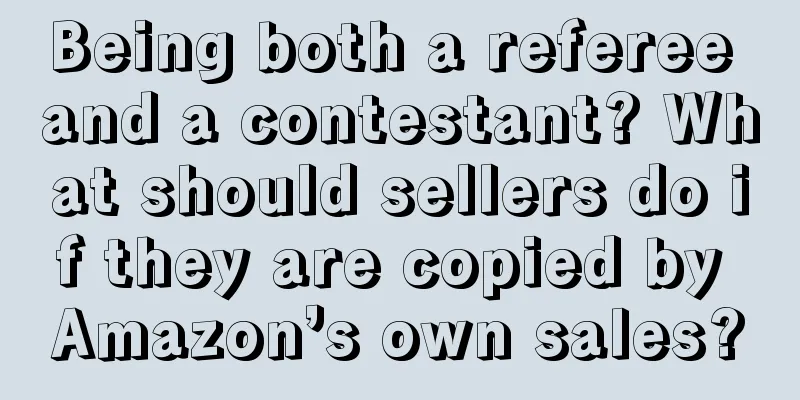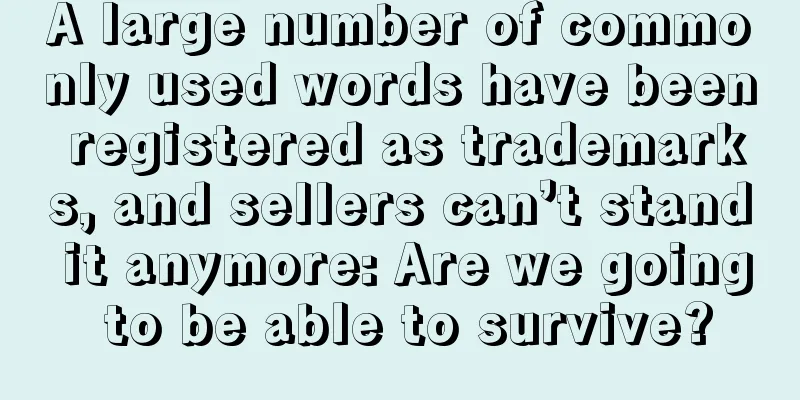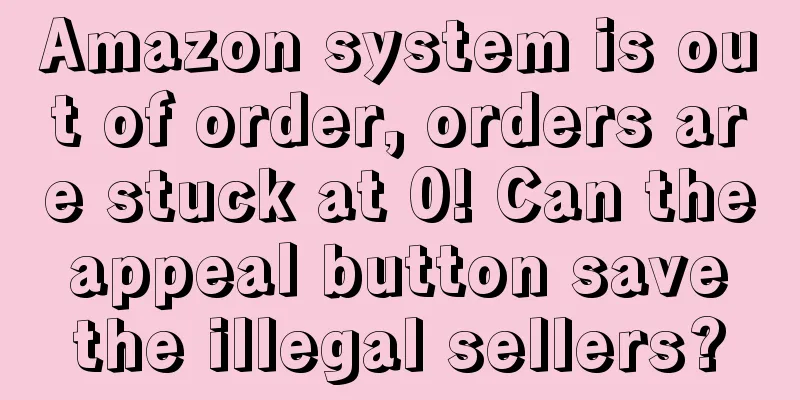Being both a referee and a contestant? What should sellers do if they are copied by Amazon’s own sales?

|
In last week’s article, we mentioned the incident of competitors pranking sellers, which triggered many sellers to denounce some of their peers.
In the cross-border e-commerce circle, similar situations are not uncommon, but in addition to domestic counterparts, sellers also face an invisible opponent, that is, Amazon's own operation.
Recently, Amazon's own operations have once again appeared in the sellers' sight, sparking heated discussions. Why is that?
As we all know, Amazon has made considerable profits from its own brands by leveraging its platform advantages and pushing suppliers to lower prices.
But even with its unique advantages and conditions, Amazon's own products are not perfect. Instead, problems frequently occur, causing dissatisfaction among many buyers.
Not long ago, Amazon's product "Amazon Basics" had a serious spontaneous combustion problem. Several National Party senators jointly requested that Amazon remove these dangerous products from the shelves, but Amazon only removed a few products involved without explaining the reasons for the removal. After the incident was exposed, Amazon Basics still occupied the best position in the platform's search display, reflecting the suspected monopoly problem of the Amazon platform.
In addition to being criticized for product quality issues, Amazon's own operations also face infringement warnings from well-known brands.
On September 24, according to the US Business Insider website, US furniture giant Williams-Sonoma filed a lawsuit against Amazon.
Sonoma has accused Amazon's own furniture brand Rivet of plagiarizing the designs of three patented chairs of its subsidiary brand West Elm (hereinafter referred to as WSI). Sonoma said in the lawsuit that Amazon's own furniture brand Rivet sells counterfeits of WSI's popular series of furniture. Currently, Amazon has stopped selling the relevant products.
In addition to the above problems, Amazon's unfair competition against sellers also causes headaches for sellers.
In recent years, Amazon has not only expanded its own product categories, but has also been constantly "touching" third-party sellers and constantly copying their listings. Recently, a seller shared his experience on a forum about his Australian store being copied by Amazon's own sellers.
The seller said that the Australian site is very small, and if there is an order every few days, there will be hundreds of people in the major categories. Once there is a slight improvement, they will follow the sales. The most recent follower is Amazon US , which has no feedback column and buyers cannot leave feedback. There are many listings in its account, including all kinds of brands.
After discovering that his products were being copied, the seller closed the Amazon logistics export settings on the Australian site. However, a week has passed and there has been no change. The brand complaint case opened a week ago has also received no response.
Regarding the issue of Amazon's own sales copycat, the seller also raised several questions: 1. As a brand seller, you need to provide invoice authorization and other information on Amazon. Why can Amazon sell directly on its own? 2. Why can Amazon US grab the seller’s Australian FBA inventory shopping cart? This is equivalent to using the seller’s hand to slap the seller in the face. 3. When the Australian site has not yet grown strong, Amazon is eager to oppress third-party sellers. What is its intention? In the comment section of the post, some sellers also said: Market competition has always been a case of the survival of the fittest, and Amazon's self-operated business is both a referee and a contestant.
In fact, the situation of Amazon's own operations following third-party sellers has existed for a long time, but third-party sellers cannot use the usual methods of following others to sell on Amazon's own operations.
As an official Amazon product, it has too many privileges and advantages that most small and medium-sized sellers cannot compete with. Therefore, when encountering Amazon's own copycat sales, sellers are often angry and helpless.
▲ The picture comes from the seller communication group
According to a data, the number of listings of third-party sellers on Amazon exceeds 90%, but in fact, the GMV is mostly only around 60-70%. This shows that compared with Amazon's own brands, the revenue-generating ability of third-party sellers' listings is much worse. 1. Amazon’s self-operated business reduces delivery fees and commissions, so the cost is extremely low. 2. Amazon can easily access buyer data, understand buyer psychology, and develop competitive products. 3. The Amazon brand has its own halo and is easy to gain the trust of users. In recent years, Amazon's own brands have shown a trend of sustained growth, which has also invisibly brought considerable competitive pressure to third-party sellers. However, Amazon's own brands are not unbeatable. When sellers encounter Amazon's own brand copycat sales or other unfair competition, the following suggestions can be used for reference.
1. Contact customer service as soon as possible After discovering that their products are being copied, sellers need to open a case as soon as possible. The materials they need to provide include packaging pictures with EAN or UPC codes, official website links, packaging pictures with brand names, etc. 2. Build a good brand website Brand sellers can first build their own brand website, and then constantly link to the website and declare ownership. At the same time, the website must have a UPC. If the website copy, pictures, and UPC are all consistent, the editing rights can be easily restored. 3. Adhere to quality and standards If you are an FBA seller with high product praise and fair prices, then in the long run, your brand will be recognized by customers. In the long run, it will not be a problem for you to share the gold shopping cart with Amazon or even monopolize the gold shopping cart. 4. Use your strengths In fact, many of Amazon's products are shipped directly from manufacturers, which greatly increases the time it takes to process an order. This is when the advantage of cross-border sellers comes into play - logistics. Sellers can provide faster express delivery services to give customers a better shopping experience. 5. Keep innovating Creating product variations with new ASINs, such as creating bundles on an ASIN or launching a simplified packaging version, can make you more competitive. 6. Use Amazon to your advantage In fact, Amazon's copy-selling of your products will greatly improve your sales ranking. Amazon's copy-selling of your products is also a recognition of you. Once Amazon leaves the competition, your order volume will increase greatly. In short, judging from the above problems, Amazon's platform rules still need to be improved. Its own-brand copy-selling behavior of third-party sellers not only harms the interests of sellers, but also goes against the market rules of fair competition. While sellers are waiting for the Amazon platform mechanism to be improved, they can also pay more attention, strengthen their own strength, and make good products and services.
The platform and sellers should be a community of interests. Only when both parties stand on a united front can they maximize their common interests and achieve a win-win situation.
Text✎ Yi Xin/ Statement: When reprinting this article, the title and original text must not be modified, and the source and original link must be retained. |
<<: Amazon Prime Day 2020 has been officially announced! You need to make these 4 preparations!
Recommend
Seller costs have risen again! USPS announced that it will impose a peak season surcharge starting October 2!
<span data-docs-delta="[[20,"USPS"],[...
Teach you how to count the orders of Amazon's off-site discount codes in real time (2023 version)
text We have introduced the settings of discount ...
Walmart announces a significant reduction in clothing prices! It seems that it can't withstand the decline in performance
<span data-docs-delta="[[20,"获悉,据外媒报道,近日沃尔...
What is Schwab.de? Schwab.de Review
Schwab.de is an e-commerce platform under the Otto...
Another wave of store closures?! Amazon is secretly taking action
Last time I told you that the European Union has ...
What is Vinted? Vinted Review
Vinted is a second-hand clothing trading platform ...
Learn how to place YouTube ads and never worry about traffic
YouTube is a very suitable channel for sellers to ...
What is the Egg Picking Network? Egg Picking Network Review
Shenzhen Jiandan Network Technology Co., Ltd. (Jia...
Amazon Performance Update! This defect rate is included in the indicator
Let’s start today’s main text. ◆ ◆ ◆ ◆ The US site...
Sellers must read! Amazon US has updated its bundling policy again
text Recently, Amazon US has once again updated i...
How to determine the specific cause of copyright infringement
In the actual operation process, the risk of infr...
Walmart ranks first in global revenue with $611 billion, Amazon lags behind by $100 billion!
According to data from Statista's company data...
More than 50,000 people protested in France, and the "aftermath of the epidemic" continues in the cross-border e-commerce circle...
Recently, the American magazine Time released the ...
Another big seller is sued! Equity merger terminated, thousands of stores become hidden dangers!
▶ Video account attention cross-border navigation ...
What is Bluetech Forum? Review of Bluetech Forum
Founded in 2012, Bluetech Forum, a subsidiary of B...









